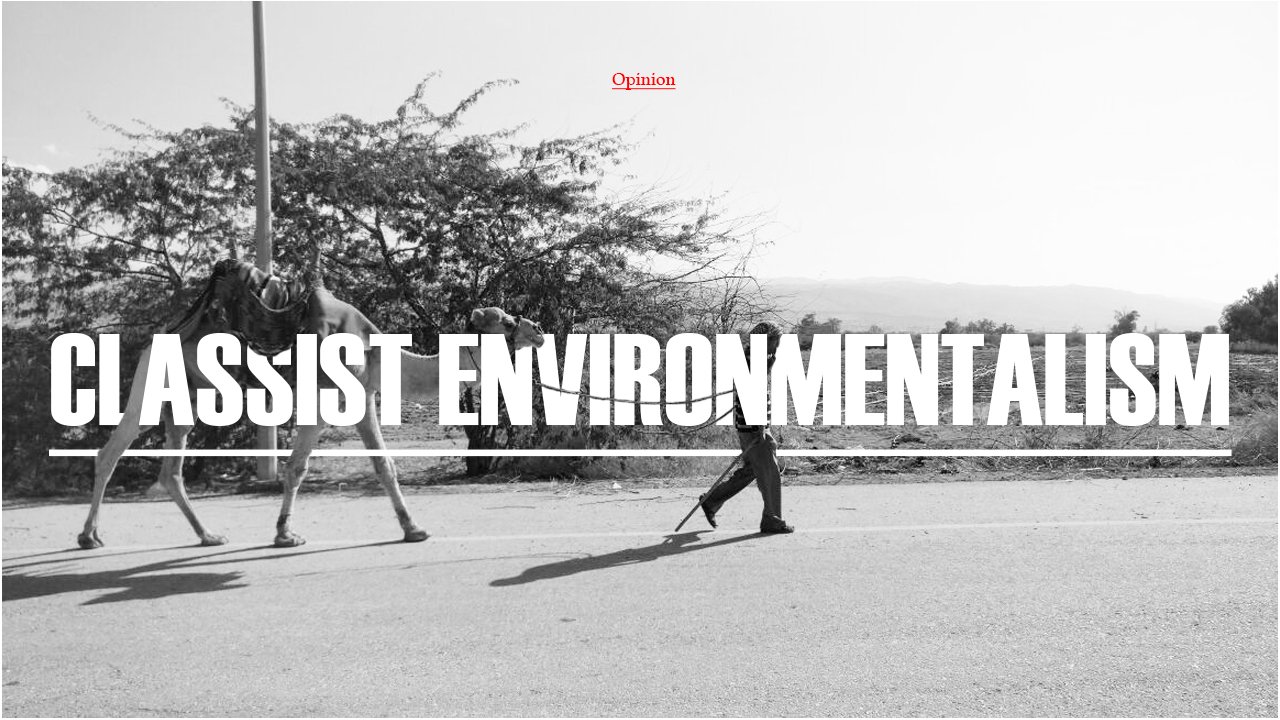Photo taken in Ghor area in Jordan where farmers are suffering the most from environmental injustice and degradation
Amman – Jordan
Corporate Green-Washed Environmental Movements are classist, and they fail to meaningfully address environmental issues and propose solutions.
While privileged policy-makers, activists, academics, and social media influencers are attending fancy conferences and discussing environmental degradation as something that will hurt their children’s children in the future, low-income communities and the working class are already, as you read this, living with the consequences affecting every aspect of their livelihood, health and well-being.
National and local entities pride themselves as leaders in striving to solve the issues of climate change and environmental degradation, while the country’s disadvantaged communities continue to suffer the ramifications of the environmental crisis.
Classist environmentalism is created by the privileged, led by the privileged, and routinely excludes the working class and underprivileged communities from the conversation, their involvement is not valued or even encouraged.
We are continuously bombarded with “Save-the-Environment” campaigns and initiatives, by local and international entities, excluding the working class and undermining local perspectives and traditional knowledge/culture; instead, foreign “experts” are flown in from all over the world to “help” us, to "teach" us, but of course those people rarely know what our problems are nor do they give a viable solution.
While on the other hand, small scale farmers and local experts and grass-roots movements have been advocating for the environment for far longer, they know our land best, but their actions rarely reach the media unless they are especially catchy or creative.
The issue here is that mainstream environmentalists often fail to understand and support the working-class as these communities usually follow a non-Western ecological valuation, they don’t necessarily fit donor agendas or care about UN reports; They are the group most affected by environmental challenges, yet the most neglected in the journey towards a greener future. The focus is drawn away from them and to the interests of “trendy global” movements and activists with black glacier glasses.
Those initiatives and movements are not rooted in working-class organizations and communities, and that is why they will always fail to make an impact.
Social media influencers caption their nature photos with cliché slogans like “Save Earth”, “let’s make it happen” and “action now”, allowing for an illusion of action and a feel-good notion; And NGOs and national actors tag their initiatives and speeches with progressive mottos on “sustainability” and “raising our voice for soil”; But what does that even mean in our context of exclusion and inequality ?
How about we, for example, prioritize:
· Protesting the uncontrolled urban sprawl and mega developments on agricultural lands;
· Or advocating for providing healthier living spaces and neighborhoods for the working class;
· Or protecting the local farmer’s rights to fair working conditions;
· Or stopping deforestation;
· Or protesting that low-income neighborhoods and towns are unjustly subjected to hazardous conditions in a way wealthier areas aren't.
How about we “make that happen” …
The current classist narrative around the environment is rooted in capitalism and consumerism, and it largely overlooks the intersectionality of social and economic inequality with the environment; And it is dangerous, it further exacerbates the class gap within the community, which is directly related to environmental degradation.
Unless we dare to dismantle this system of exploitation there is absolutely no use in us supporting global and “viral” campaigns on the environment. The impact of those initiatives on environmental rejuvenation is almost nil to nothing, but the effect of sheltering those responsible and accountable for environmental degradation from meaningful criticism, is readily apparent.
Billions of people are already, right now, seeing the consequences of environmental harm, and those campaigns are nothing more than PR and a distraction from the real problem. If the movement actually wants to make a change, it needs to be holistic and inclusive in its approach.
Support the working class and local grass-roots and experts in their authentic struggle to save ourselves and environment.
They are the heroes.
